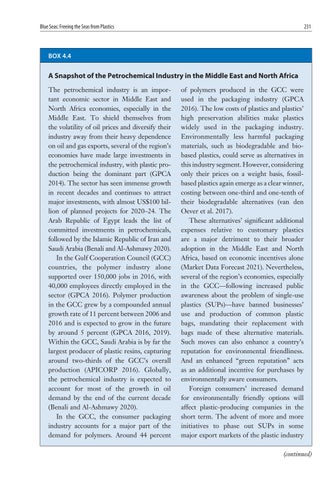Blue Seas: Freeing the Seas from Plastics
231
BOX 4.4
A Snapshot of the Petrochemical Industry in the Middle East and North Africa The petrochemical industry is an important economic sector in Middle East and North Africa economies, especially in the Middle East. To shield themselves from the volatility of oil prices and diversify their industry away from their heavy dependence on oil and gas exports, several of the region’s economies have made large investments in the petrochemical industry, with plastic production being the dominant part (GPCA 2014). The sector has seen immense growth in recent decades and continues to attract major investments, with almost US$100 billion of planned projects for 2020–24. The Arab Republic of Egypt leads the list of committed investments in petrochemicals, followed by the Islamic Republic of Iran and Saudi Arabia (Benali and Al-Ashmawy 2020). In the Gulf Cooperation Council (GCC) countries, the polymer industry alone supported over 150,000 jobs in 2016, with 40,000 employees directly employed in the sector (GPCA 2016). Polymer production in the GCC grew by a compounded annual growth rate of 11 percent between 2006 and 2016 and is expected to grow in the future by around 5 percent (GPCA 2016, 2019). Within the GCC, Saudi Arabia is by far the largest producer of plastic resins, capturing around two-thirds of the GCC’s overall production (APICORP 2016). Globally, the petrochemical industry is expected to account for most of the growth in oil demand by the end of the current decade (Benali and Al-Ashmawy 2020). In the GCC, the consumer packaging industry accounts for a major part of the demand for polymers. Around 44 percent
of polymers produced in the GCC were used in the packaging industry (GPCA 2016). The low costs of plastics and plastics’ high preservation abilities make plastics widely used in the packaging industry. Environmentally less harmful packaging materials, such as biodegradable and biobased plastics, could serve as alternatives in this industry segment. However, considering only their prices on a weight basis, fossilbased plastics again emerge as a clear winner, costing between one-third and one-tenth of their biodegradable alternatives (van den Oever et al. 2017). These alternatives’ significant additional expenses relative to customary plastics are a major detriment to their broader adoption in the Middle East and North Africa, based on economic incentives alone (Market Data Forecast 2021). Nevertheless, several of the region’s economies, especially in the GCC—following increased public awareness about the problem of single-use plastics (SUPs)—have banned businesses’ use and production of common plastic bags, mandating their replacement with bags made of these alternative materials. Such moves can also enhance a country’s reputation for environmental friendliness. And an enhanced “green reputation” acts as an additional incentive for purchases by environmentally aware consumers. Foreign consumers’ increased demand for environmentally friendly options will affect plastic-producing companies in the short term. The advent of more and more initiatives to phase out SUPs in some major export markets of the plastic industry (continued)






